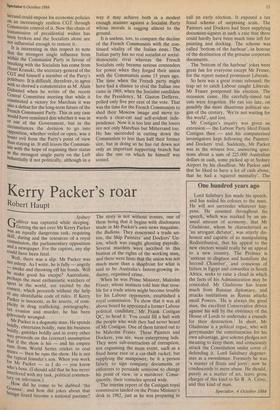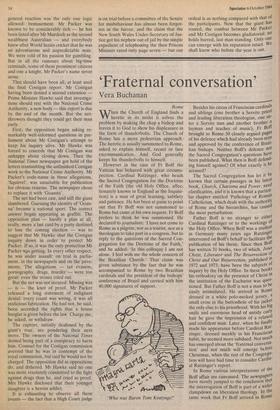Kerry Packer's roar
Robert Haupt
Sydney Sydney Gulliver was captured while sleeping. Getting the net over Mr Kerry Packer was an equally dangerous task, requiring skill, daring and the resources of a royal commission, the parliamentary opposition and a newspaper. For the captors, any slip could have been fatal. Well, there was a slip. Mr Packer was not asleep. As I write, he is fully — angrily awake and throwing off his bonds. Will tie make good his escape? Australians, Perhaps the most enthusiastic watchers of Sport in the world, are excited by the contest, which proceeds without the help ?st. any identifiable code of rules. If Kerry r a.cker is innocent, as he asserts, of com- Pitchy in drug trafficking, pornography, tax evasion and murder, he has been grievously wronged. Mr Packer is a dogmatic man. He spends 13°I, Idly, entertains boldly, runs his business w°1d1Y, gambles boldly and in every other Way proceeds on the (correct) assumption that if the show is his — and his empire ru.ns from World Series cricket to coal mines — then he runs the show. He is not he typical founder's son. When you work for Mr Packer — as I do — you know Who's boss. (I should add that he has never interfered with my task, political commen- tary on television.) How did he come to be dubbed 'the Goanna', and how did jokes about that benign lizard become a national pastime?. The story is not without ironies, one of them being that it begins with disclosures made in Mr Packer's own news magazine, the Bulletin. They concerned a trade un- ion, the Ship Painters' and Dockers' Un- ion, which was caught ghosting payrolls. Several murders were ascribed to this bastion of the rights of the working man, and there were hints that the union was not much more than a shopfront for what is said to be Australia's fastest-growing in- dustry, organised crime.
When he was Prime Minister, Malcolm Fraser, whose instincts told him that trou- ble for a trade union might become trouble for his Labour opponents, established a royal commission. To show that it was all above board he appointed a former Labour political candidate, Mr Frank Costigan QC, to head it. You could fill a hall with the people who wish they had never heard of Mr Costigan. One of them turned out to be Malcolm Fraser. These Painters and Dockers, you see, were enterprising lads. They were sub-contractors of corruption, not organising the main event, such as a fixed horse race or a car-theft racket, but supplying the manpower, be it a person falsely to sign company documents or enforcers to persuade someone to change his point of view, or a murderer. Conse- quently, their tentacles spread wide.
The interim report of the Costigan royal commission landed on the Prime Minister's desk in 1982, just as he was preparing to call an early election. It exposed a tax fraud scheme of surprising scale. The Painters and Dockers had been supplying document-signers at such a rate that there could hardly have been much time left for painting and docking. The scheme was called 'bottom of the harbour', in honour of the destination of the genuine corporate documents.
The 'bottom of the harbour' jokes were great fun for everyone except Mr Fraser, for the report named prominent Liberals.
So here was a great ironic rebound: the trap set to catch Labour caught Liberals. Mr Fraser postponed his election. The recession came. His carefully-timed tax cuts were forgotten. He ran too late, on possibly the most disastrous political slo- gan of the century, 'We're not waiting for the world', and lost.
Mr Costigan's inquiry was given an extension — the Labour Party liked Frank Costigan then — and his computerised investigators kept following the Painters' and Dockers' trail. Suddenly, Mr Packer was in the witness box, answering ques- tions about a sum of 225,000 Australian dollars in cash, some picked up at Sydney Airport by his chauffeur. Mr Packer said that he liked to have a lot of cash about, that he had a 'squirrel mentality'. The general reaction was the only one logic allowed: bemusement. Mr Packer was known to be considerably rich — he has been listed after Mr Murdoch as the second wealthiest Australian — and everybody knew after World Series cricket that he was an adventurous and unpredictable man. We were told of his passion for gambling. But in all the rumours about big-time criminals, some of them prominent citizens and one a knight, Mr Packer's name never arose.
That should have been all, at least until the final Costigan report. Mr Costigan having been denied a second extension — Prime Minister Hawke said that investiga- tions should rest with the National Crime Authority, a new body — this report is due by the end of the month. But the net- throwers thought they could get their man early.
First, the opposition began asking re- markably well-informed questions in par- liament about Mr Costigan's attempt to keep his inquiry alive. Mr Hawke was forced to concede that Mr Costigan was unhappy about closing down. Then the National Times newspaper got hold of the letters transmitting the unfinished Costigan work to the National Crime Authority. Mr Packer's code-name in these allegations, 'Squirrel', was unsuitable for publication for obvious reasons. The newspaper chose to replace it with `Goanna'.
The net had been cast, and still the giant slumbered. Guessing the identity of 'Goan- na' became a national sport. The correct answer began appearing as graffiti. The opposition plan — hardly a plan at all, really, more a last card by a party destined to lose the coming election — was to suggest that Mr Hawke shut the Costigan inquiry down in order to protect Mr Packer. If so, it was the only protection Mr Packer wAs getting. In every other respect, he was under assault: on trial in parlia- ment, in the newspapers and on the pave- ments. The allegations — tax evasion, pornography, drugs, murder — were too great: even the stones cried out.
But the net was not secured. Missing was — is — the knot of proof. Mr Packer released a long statement of indignant denial: every count was wrong, it was all malicious fabrication. He had not, he said, been accorded the rights that a house burglar is given before the law. Charge me, he asked, or withdraw.
The captors, initially deafened by the giant's roar, are pondering their next move. The owners of the National Times denied being part of a conspiracy to harm him. Counsel for the Costigan commission averred that he was in contempt of the royal commission, but said he would not be charged. The opposition did as oppositions do, and dithered. Mr Hawke said no one was more resolutely committed to the fight against drugs than he, and cried as proof. Mrs Hawke disclosed that their younger daughter is a heroin addict.
It is exhausting to observe all these events — the fact that a High Court judge
is on trial before a committee of the Senate for misbehaviour has almost been forgot- ten in the furore, and the claim that the New South Wales Under-Secretary of Jus- tice got his nephew out of jail by the simple expedient of telephoning the then Prisons Minister rated only page seven — but our ordeal is as nothing compared with that of the participants. Now that the giant has roared, the combat between Mr Packer and Mr Costigan becomes gladiatorial: no holds barred, last man standing. Only one can emerge with his reputation intact. We shall know who before the year is out.















































 Previous page
Previous page